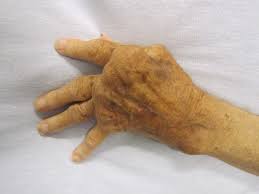
Rheumatoid arthritis (RA) is a chronic inflammatory disease that primarily affects the joints but can also impact other organs and systems in the body. It is an autoimmune condition in which the immune system attacks its own tissues, leading to inflammation of the joints and destruction of joint tissues.
Causes and Mechanism of Development:
Rheumatoid arthritis develops due to a combination of genetic, environmental, and immunological factors. Individual genetic predisposition, viral infections, and other environmental conditions can trigger the development of the disease. As a result, the immune system begins to attack the joints, causing inflammation, swelling, and destruction of cartilage and bone tissue.
Symptoms:
- Pain and swelling in the joints, usually symmetrically (for example, in both hands simultaneously).
- Morning stiffness in the joints, which can last for more than 1 hour.
- Sensation of warmth and redness around the affected joints.
- Fatigue, weakness, loss of appetite, and weight loss.
- Possible involvement of other organs such as the heart, lungs, or skin.
Diagnosis:
Diagnosis of RA is based on a medical examination, medical history, as well as the results of laboratory and imaging studies. This includes blood tests for inflammatory markers such as C-reactive protein and rheumatoid factor, joint examination using X-rays or magnetic resonance imaging.
Treatment and Management:
Treatment of RA aims to reduce pain, inflammation, preserve joint mobility, and prevent further destruction of joint tissue. This may include the use of anti-inflammatory medications such as nonsteroidal anti-inflammatory drugs and corticosteroids, immunomodulators, physiotherapy, and surgical intervention in advanced cases.
Prognosis:
Rheumatoid arthritis is a chronic condition, and its prognosis can vary from person to person. With early and adequate treatment, most people with RA can achieve symptom improvement and slow the progression of the disease, although disease management often requires long-term collaboration with a physician and the use of various therapeutic strategies.
